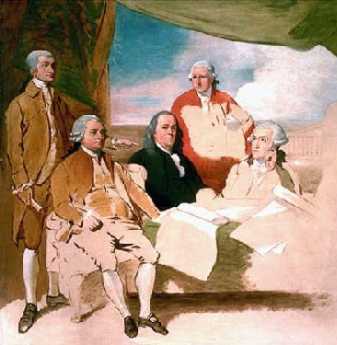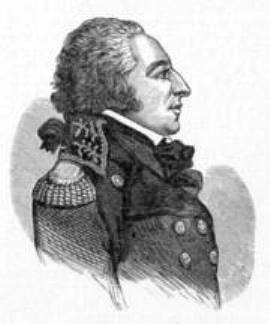Related Topics
George Washington in Philadelphia
Philadelphia remains slightly miffed that Washington was so enthusiastic about moving the nation's capital next to his home on the Potomac. The fact remains that the era of Washington's eminence was Philadelphia's era; for thirty years Washington and Philadelphia dominated affairs.
French Philadelphia
French Philadelphia
Citizen Genet

|
| America and France signed a treaty of alliance |
In 1788, America and France signed a treaty of alliance, which clearly rescued the American Revolution from disaster. We owed France "big time". After the French King was executed, Great Britain, Spain and other monarchies declared war on France, and the French expected our help. However, eight years of war had left the United States in disorder, and President George Washington was determined to keep us out of any entanglements which slowed our recovery. This probably would have been true in any circumstances, but in addition, the U.S.-French alliance had deteriorated even at the Treaty of Paris. In diplomatic circles, the defining quip was that we signed a separate peace with Britain, "Betraying the French before the French had a chance to betray us." We were certainly not going to ally ourselves with the British after eight years of war, so the only possible stance was the one Washington adopted -- neutrality. No foreign entanglements.

|
| Edmond-Charles Genet |
The French government at that moment was in the hands of the Girondists who were plenty radical, but positively meek compared with the Jacobins who soon took control and employed the guillotine routinely. The Girondists exercised particularly poor judgment in sending Edmond-Charles Genet to the United States to enlist help in their war with England and Spain, because he had just been declared persona non grata and expelled by Catherine the Great from the Russian embassy, with the notation that he was "not only superfluous but intolerable." He was only 31 years old, generally regarded as a genius for being able to read French, English, Italian, Swedish, and German -- by the age of 12. Whatever the truth of this claim, it was instantly recognizable that he was wild and uncontrollable, without a shred of prudence.
Although it is part of the diplomatic minute that a new ambassador's first act is to present his credentials to the head of government in his new post, Genet headed instead for Charleston, SC. Probably with the idea of wasting no time getting down to business, he soon enlisted four privateers in Charleston to begin predations on the British and Spanish in the West Indies. By the time he finally got to present those credentials to George Washington, he had stirred up several commotions between us and the British, since part of his mission was to get the two of us into war with each other. Meanwhile, he quickly made himself a political threat by becoming the toast of the town in Charleston, and even after he arrived in Philadelphia. At a time when his position with Washington, Hamilton, and even Thomas Jefferson was strained, he attended a famous dinner party with Governor Thomas Mifflin in attendance, and ceremoniously cut off the head of a roast pig in guillotine fashion, ho, ho, ho. Not only was this gauche, crude and disgusting, but it was also pretty stupid. Thomas Mifflin, after all, had been the real instigator of the so-called Conway Cabal to depose George Washington from command of the Continental Army at Valley Forge, so Citizen Genet got political black marks just by going to the dinner. He was spared the indignity of expulsion by the replacement of the Girondists by the Jacobins, who promptly sent a warrant for his arrest. Since that surely meant he would be beheaded, Washington gave him sanctuary.
The British uproar was intense after the depredations of Genet's privateers using American refuge, and Washington dispatched John Jay to England to patch things up. The outcome was a treaty with the usual diplomatic mixture of goodies and concessions. In this case, the British troops who had been left behind on the American western frontier in violation of the terms of the Treaty of Paris were recalled, and payments were made for some war damages. But in return, Jay had to agree to limit American trade in the West Indies; and that inevitably caused denunciations from the growing anti-Federalist faction. Congress was eventually persuaded to ratify the Treaty but Washington paid a political price for neutrality with both the French and the British. Politicians were starting to act with characteristic intransigence. Throughout all this mess, Washington behaved with characteristic calm and reserve, but in fact, he was pretty down-hearted about it.
Under the circumstances, Genet worked the dinner circuit and married Cornelia Clinton, the daughter of the Governor of New York. After a few years, she died, and he remarried Martha Osgood. He became a gentleman farmer on a farm overlooking the Hudson River, and nothing much was heard about him for the next 40 years.
Originally published: Tuesday, August 16, 2011; most-recently modified: Wednesday, May 15, 2019